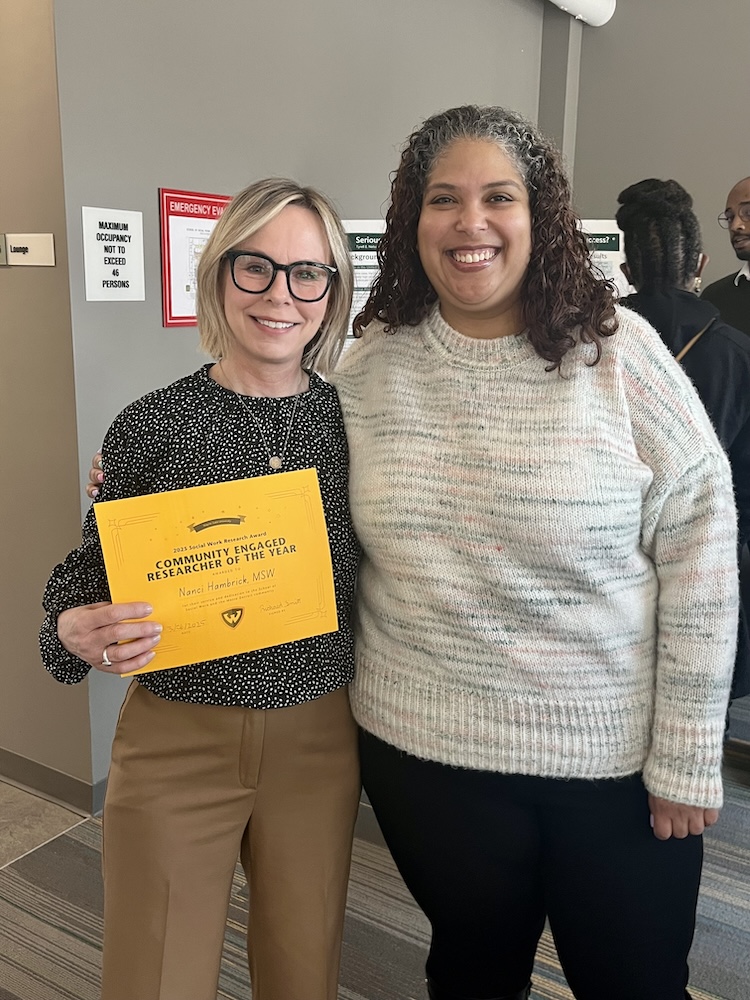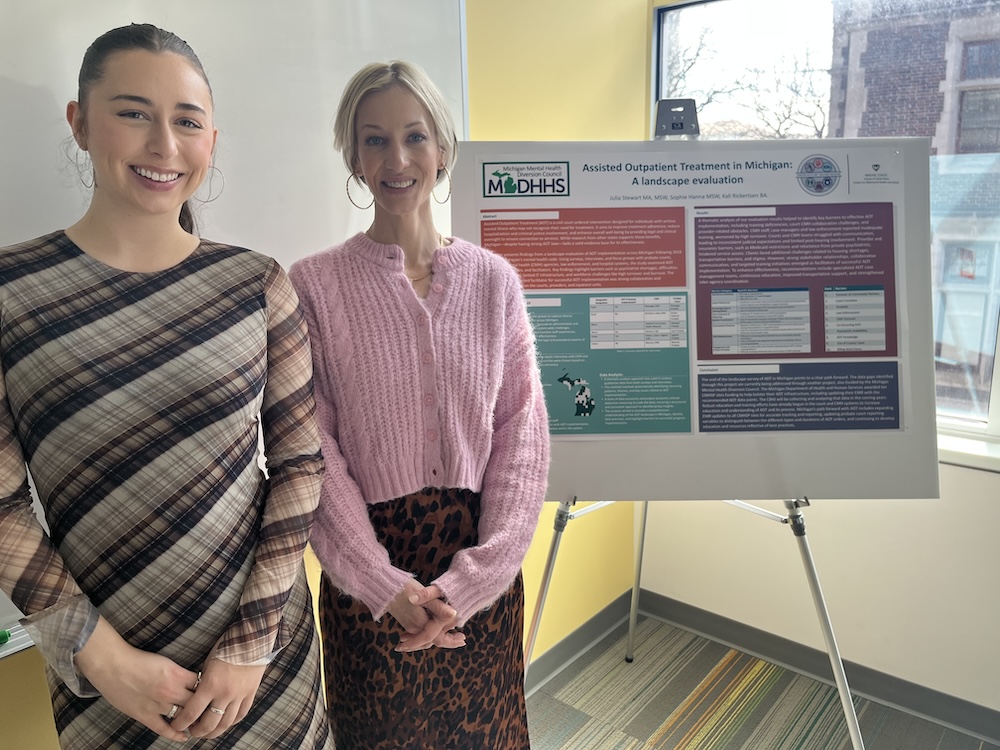CBHJ staff contribute to annual Social Work Research Symposium

The Center for Behavioral Health and Justice (CBHJ) at Wayne State University’s School of Social Work was well represented at the eighth annual Research Symposium hosted by the Center for Social Work Research.
The event featured 14 posters from researchers across the School of Social Work, with CBHJ team members and interns showcasing their work on behavioral health and justice-related topics, from mental health screenings in jails to opioid overdose prevention.
This annual event provides a valuable platform for students and researchers to present their work and strengthen their presentation skills. Featuring a wide range of topics—from ongoing studies to completed projects—the event highlights the real-world impact of social work research. Attendees can engage directly with presenters, exchange insights, and explore how research informs practice and policy.
The symposium also celebrated outstanding contributions to social work research with the inaugural Social Work Research Awards. Nanci Hambrick, manager of the CBHJ’s Wayne County initiative and Shantalea Johns, assistant professor and director of continuing education for the School of Social Work, were co-recipients of the Community Engaged Researcher of the Year, and Scott Lantz, a grant/contract administrator for the Center for Social Work Research, was named Research Staff of the Year.

“It was awesome to see all of the work being done across the School of Social Work and it was validating for me as a student to be able to contribute my own research,” said student Tyrell E. Nelson-Woodard. “I received valuable feedback and gained perspective from the discussions I had with attendees that I think will enhance my project moving forward.”
Nelson-Woodard is a CBHJ intern working as a Prescription Drug Overdose Prevention (PDO) research assistant with the data team, working under the direction of Manager Edita Milanovic. His poster, “Serious mental illness and reentry: What factors impact post-jail success,” examined how different screening methods for serious mental illness (SMI) in jails impact post-release success. Using data from the Kessler-6 (K6) screening tool and jail-based identification, the study compared outcomes such as recidivism and service engagement. Initial findings showed slight variations in post-jail success rates depending on the identification method. The research highlights the need for improved screening and service continuity. Nelson-Woodward plans to continue his research at the CBHJ. His next steps on the project include regression analysis to better understand which factors predict positive outcomes for individuals with SMI after release.
“Tyrell was involved in the research process from the beginning. I was excited to support Tyrell in this process and see him present in person,” said Milanovic. “He was professional, prepared to discuss the work, and answered questions confidently from the audience. He did a wonderful job, and I am excited for him to turn this work into a manuscript!”

In addition to student-led research, CBHJ staff members presented findings on critical behavioral health initiatives affecting Michigan communities. Julia Stewart, the CBHJ’s Assisted Outpatient Treatment (AOT)/Courts initiative project lead and Program Assistant Kali Rickertsen, presented “Assisted Outpatient Treatment in Michigan: A landscape evaluation.” Their poster examined the implementation of Assisted Outpatient Treatment (AOT) in Michigan, highlighting both its potential and its challenges. The research found that while AOT aims to improve treatment adherence and reduce criminal justice involvement, barriers such as psychiatrist shortages, tracking difficulties, and workforce burnout limit its effectiveness. However, the team has found that strong collaboration between courts, providers, and hospitals can improve the chances of successful outcomes for individuals on AOT orders. The study emphasizes the need for improved data tracking, training, and coordination to strengthen AOT’s impact and better connect individuals with serious mental illness to essential care.
Project coordinators from the CBHJ’s Opioid Treatment Ecosystems initiative Jenai Gonzalez, Alexandria Hughes, and Haley Hicks presented “An implementation science evaluation of a county-wide public health intervention to increase community-based naloxone saturation.” The poster featured the Well Wayne Station Initiative, a public health intervention aimed at expanding community-based naloxone distribution in Wayne County, Michigan. The research explores factors that influence the success of naloxone vending machines and newsstands, including safety perceptions, accessibility, and community attitudes. The study evaluates how these access points impact overdose rates and whether concerns such as increased arrests arise. Findings will help shape best practices for harm reduction efforts and inform future public health strategies in opioid overdose prevention.

Hicks also presented “Diversity, classroom representation, and bullying among gender diverse students: A proposed study” from her research with colleagues Amber Williams, Joanne Smith-Darden and Poco Kernsmith.
“This symposium is a testament to the incredible work being done by CBHJ staff, and I couldn’t be prouder of their contributions,” said Liz Tillander, CBHJ director of operations. “Their research not only advances our understanding of behavioral health and justice issues but also drives meaningful change in the communities we serve. Seeing their passion and expertise on display was truly inspiring.”
About the Center for Behavioral Health and Justice
The Center for Behavioral Health and Justice at the Wayne State University School of Social Work delivers actionable data, person‐centered research and evaluation, and collaborative technical assistance at the behavioral health/criminal legal intersection to empower community partners to adopt high‐impact care solutions. We envision a society that prevents, deflects, and diverts people with behavioral health concerns from the criminal legal continuum to appropriate care settings as a means to optimize individual and community wellbeing.
About the Center for Social Work Research
The Center for Social Work Research connects faculty, students, and community organizations to advance research that strengthens urban communities. The Center provides resources to support learning and faculty scholarship while offering planning, evaluation, and research services through a fee-for-service model. Committed to fostering meaningful partnerships, it collaborates with organizations to enhance their capacity for future research. The Center’s work highlights faculty and student research, as well as community engagement initiatives that bridge social work practice and research.